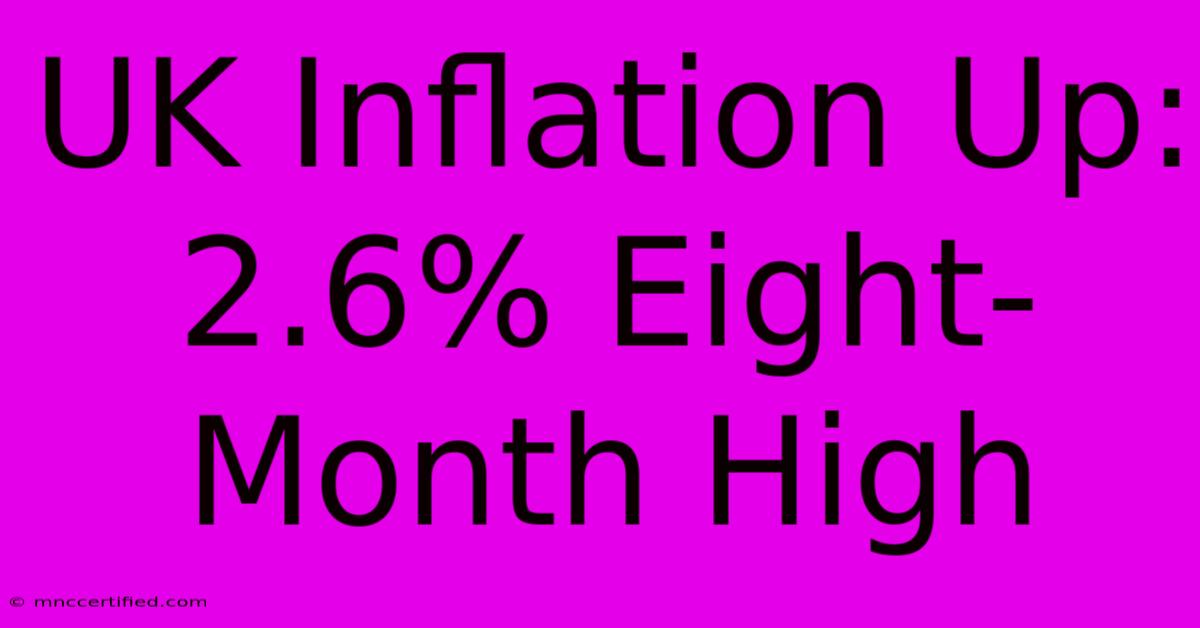UK Inflation Up: 2.6% Eight-Month High

Table of Contents
UK Inflation Up: 2.6% Eight-Month High – What Does It Mean for You?
The UK's inflation rate has climbed to 2.6%, its highest level in eight months, sparking concerns among economists and consumers alike. This increase, released by the Office for National Statistics (ONS), signals a potential shift in the economic landscape and raises questions about the future cost of living. This article delves into the details of this rise, explores its potential causes, and examines its implications for the UK economy and its citizens.
Understanding the Inflation Figure: 2.6%
The 2.6% inflation figure represents a significant jump compared to previous months and surpasses the Bank of England's target of 2%. This means that the general price level of goods and services in the UK has increased by 2.6% compared to the same period last year. This seemingly small percentage can have a substantial impact on household budgets and purchasing power.
Key Factors Contributing to the Rise
Several factors have contributed to this recent surge in inflation. These include:
-
Energy Prices: A notable driver is the increase in global energy prices. Rising oil and gas costs translate directly into higher electricity and heating bills, impacting both businesses and consumers. This is a global issue, but the UK's reliance on energy imports makes it particularly vulnerable.
-
Supply Chain Disruptions: Ongoing supply chain issues, stemming from the pandemic and geopolitical events, continue to constrain the availability of goods. Reduced supply often leads to higher prices as demand outstrips availability. This is particularly evident in certain sectors like manufacturing and food production.
-
Increased Demand: As the economy recovers from the pandemic, demand for goods and services has increased. This increased demand, coupled with supply chain bottlenecks, creates inflationary pressure.
-
Brexit Impact: While the full impact of Brexit is still unfolding, some economists argue that it has contributed to increased costs for businesses, particularly through increased import tariffs and bureaucratic hurdles.
Implications for the UK Economy and Consumers
The rise in inflation has several important implications:
-
Reduced Purchasing Power: Higher prices mean that consumers' money buys less than it did previously, eroding their purchasing power. This can lead to decreased consumer spending and potentially slower economic growth.
-
Increased Cost of Living: The increased cost of essential goods and services, such as energy, food, and transportation, puts a strain on household budgets. This can disproportionately affect low-income households who spend a larger percentage of their income on essentials.
-
Interest Rate Hikes: The Bank of England may respond to rising inflation by raising interest rates. While this can help curb inflation by reducing borrowing and spending, it also increases the cost of borrowing for mortgages and loans, potentially impacting both businesses and consumers.
-
Uncertainty for Businesses: Inflation creates uncertainty for businesses, making it harder to plan for the future and invest. Rising input costs can squeeze profit margins and lead to job losses.
What Can You Do?
While you can't control macroeconomic factors, you can take steps to mitigate the impact of inflation on your personal finances:
-
Budget Carefully: Track your spending and identify areas where you can cut back.
-
Shop Around: Compare prices before making purchases to ensure you're getting the best deals.
-
Consider Alternative Energy Sources: Explore options to reduce your reliance on expensive energy sources.
-
Diversify Investments: Protect your savings from inflation by diversifying your investments.
Conclusion: Monitoring the Situation
The rise in UK inflation to a eight-month high of 2.6% is a significant development that warrants close monitoring. The interplay of global and domestic factors contributing to this increase necessitates a multi-pronged approach to address the issue effectively. Understanding the implications for both the economy and personal finances is crucial for navigating this challenging economic climate. The Bank of England's actions and future economic data will be key to determining the trajectory of inflation in the coming months. Stay informed and adapt your financial strategies accordingly.

Thank you for visiting our website wich cover about UK Inflation Up: 2.6% Eight-Month High. We hope the information provided has been useful to you. Feel free to contact us if you have any questions or need further assistance. See you next time and dont miss to bookmark.
Featured Posts
-
Wallace Out Dent In On Master Chef
Dec 19, 2024
-
Gaetz Report Committee Votes For Public Release
Dec 19, 2024
-
Channel 4 Popular Shows Departure After 20 Years
Dec 19, 2024
-
Mega Millions Jackpot Next Drawing Date
Dec 19, 2024
-
825 Million Mega Millions Play Smart
Dec 19, 2024